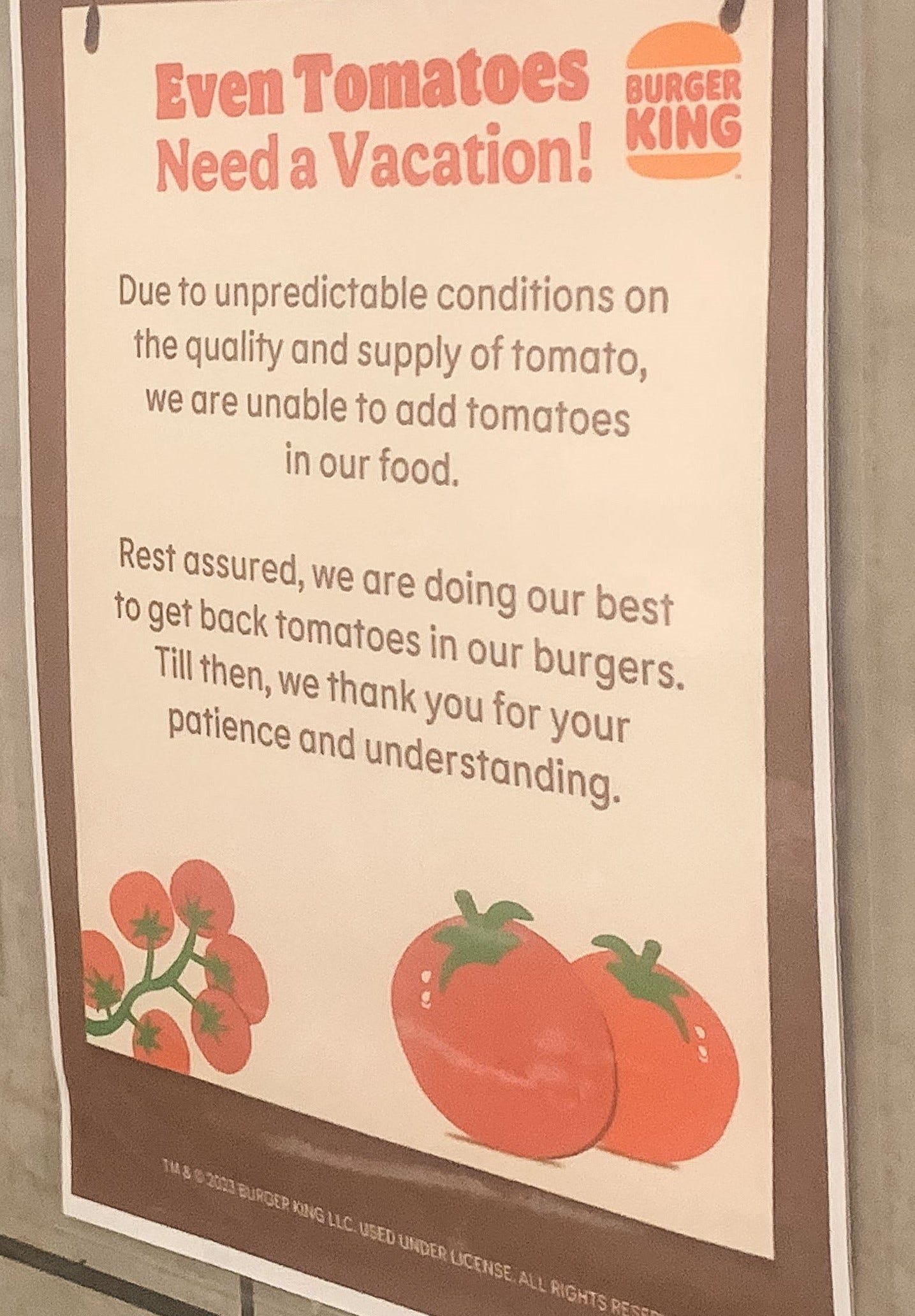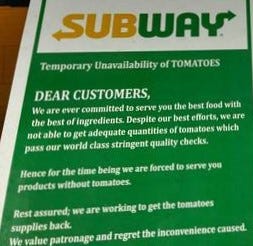Pricing Case Study: Burger King's "Tomato Vacation" Approach to Raising Prices
When should the seller publicize the fact they've degraded their product effectively raising prices?
“Earlier, we would consume about two or three kilos of tomatoes a week in our family of five. Now we are only consuming half a kilo per week.” - Neeta Agarwal, Software Developer, East Delhi
There are endless ways to raise prices indirectly without ever changing the asking or visible prices. Here’s an interesting case study of indirect price increases by Burger King and Subway stores in India in response to steeply increasing tomato prices. This case has some common aspects to other forms of hidden price increases that I’ve covered here on the Pricing Conundrum, but it also has one or two significant wrinkles worth exploring further.
The Tomato Vacation Approach to Raising Prices
This month (August 2023), Burger King and Subway stopped adding tomatoes to their sandwiches, wraps, and other menu offerings in many of their Indian stores. This came on the heels of McDonald’s withdrawing tomatoes a few weeks earlier. This “tomato vacation,” as Burger King called it, was in response to nationwide shortages and a five-fold increase in the price of tomatoes. This move by the fast food chains is noteworthy for three reasons: First, tomato slices are a significant component of menu offerings in India, where many of the items tend to be vegetarian. Second, tomato prices have been in the spotlight for the past several months, even having political repercussions.
Third and from a pricing perspective, the most interesting and uncharacteristic aspect of Burger King’s and Subway’s tomato vacation approach was that they actively advertised the fact that they had withdrawn tomatoes from their menu offerings by posting notices in their stores.
In this case study, I want to explore the reasons behind this move and draw some lessons for managers interested in using this so-called tomato vacation approach to raise prices.
First of all, why is this an indirect price increase?
Burger King’s and Subway’s sandwiches and wraps contained tomatoes before, with a certain cost to the operators and a certain benefit to the consumers (juicy goodness plus nutritional value). Now, at least temporarily, they don’t, but the prices of these items remain unchanged. In other words:
Degraded Product + Same Price = Indirect Price Increase
Here is the backstory for the tomato vacation approach that Burger King and Subway used. Tomatoes have become a focal food item in India this summer with the “red gold rush” in full swing. In the first half of the year, key tomato-producing regions of India experienced unexpected and extreme weather patterns, including excessive and persistent temperatures in some areas and heavy unseasonal rains in others. The upshot was that tomato crops were affected significantly, leading to a nationwide shortage and rising prices by as much as 500 percent compared to last year, as explained in this video.
So it makes sense that restaurants across India have curtailed the use of tomatoes this summer, effectively raising prices for customers buying their food. This, by the way, is the standard recommended practice for restaurant operators when prices of inputs go up. Substituting cheaper ingredients for more expensive ones and reducing portion sizes are two of the most widely used remedies when restaurant operators want to leave menu prices unchanged.
Publicizing the removal of tomatoes from menu offerings
The most interesting aspect of this tomato vacation case study is the fact that both Burger King and Subway chose to publicize that they had removed tomatoes from their menu offerings and degraded them by posting explanations in their stores.
Keep reading with a 7-day free trial
Subscribe to The Pricing Conundrum to keep reading this post and get 7 days of free access to the full post archives.





